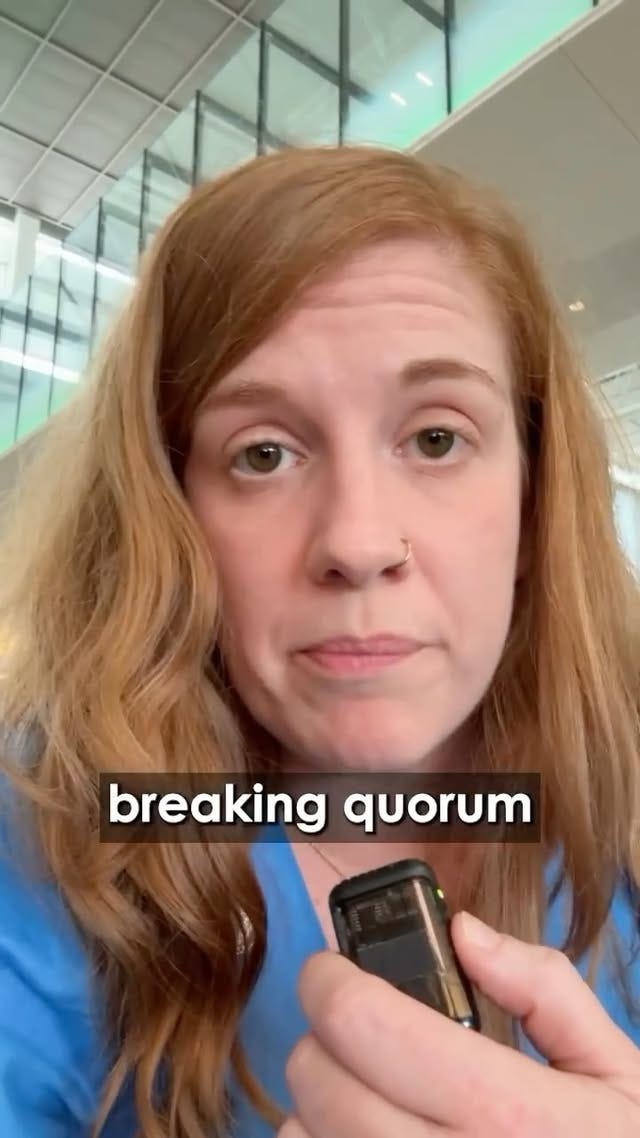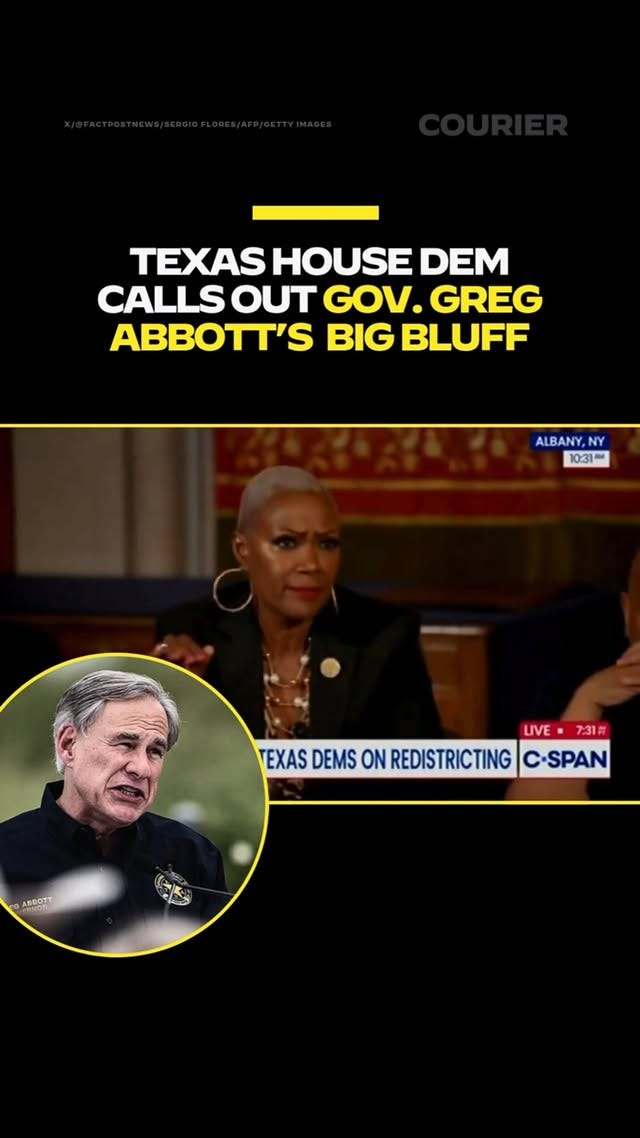Problems Caused By People Who Don't Think That Cowboy Carter Is a Good Country Album
Is “she mandered on my gerry until I redistricted Texas” a good subheader, or should I try again?
Unfortunately, this post is too long to appear in full in your inbox. I don’t know where it will cut off in the email version, but it will be available online. See you there!!!
Friends, enemies, lovers—welcome back to Emily For President. I don’t want to start any conspiracy theories as to where I’ve been for the past month, so please take care of that amongst yourselves while we jump right into today’s piece.
If you’ve ever read anything I’ve published here before, you obviously know that I have that something of a sixth sense when it comes to voter suppression bullshit. Currently on my radar is the attempt by Texas House Republicans to redraw district lines in an “attempt to flip five Democratic seats in next year’s midterm elections” (X). Why, you may ask? Because Donald Trump asked them to.
This development features some of my all-time least favorite things (Greg Abbott, the gamification of voting, the word “gerrymandering”), but given what is taking place not just in Texas but across the country, I’ve taken it upon myself to dive deep into the tomfoolery at hand. I’m sorry, you’re welcome.
For what it’s worth, as I was putting this piece together, I couldn’t help but remember the tiniest snippet of my interview with Rebecca Loftin from 2023: Rebecca and I had met at writing camp back in 2014 (brag), and during one of our sessions, as she recalls, I “casually brought up the impending Wendy Davis versus Greg Abbott election during class, as if the Texas governor race was common knowledge for every fifteen-year-old girl from Connecticut.”
Granted, I was actually sixteen at the time, which we all know is the standard age for young girls to start learning about gubernatorial politics across the country, but I digress. I think Rebecca’s memory and assessment came to mind not just because I’m once again talking about Texas as a girl from Connecticut, but because it captures an argument I have (clearly) been making for years and will continue to make until this democracy fully craps out: fuck Greg Abbott local and state politics are essential to the functionality of our day-to-day lives, and are therefore essential to know about.
And yes, I hear how that sounds and can acknowledge that maybe Rebecca was onto something, but in my defense: look where we are right now. Think about how this email found you.
Anyway, as is the E4P way, this long-winded story is my way of explaining why we’re having this conversation today. This week, we’re going to look at the components of the gerrymandering effort Texas Republicans are trying to advance to a vote literally as we speak, what ramifications that may have for voters in the state and around the country, and how we can best prepare for blatantly obvious attempts at election interference like this moving forward.
Unfortunately, we’re so back.
Everything’s Bigger In Texas…Except for the Democratic Party’s Representation
Let’s start with the basics: what is happening in Texas and why it’s occurring at all.
As I mentioned above, Texas House Republicans are attempting to gerrymander districts ahead of the 2026 Midterms in a very obvious attempt to help the GOP maintain control of the federal House of Representatives for all four years of Trump’s presidency. Gerrymandering, by any other name would be as fucked, is when voting district boundaries are “drawn with the intention of influencing who gets elected” (X).
As the Brennan Center puts it
every 10 years, states redraw their legislative and congressional district lines following the census. Because communities change, redistricting is critical to our democracy: maps must be redrawn to ensure that districts are equally populated, comply with laws such as the Voting Rights Act, and are otherwise representative of a state’s population. Done right, redistricting is a chance to create maps that, in the words of John Adams, are an “exact portrait, a miniature” of the people as a whole.
But sometimes the process is used to draw maps that put a thumb on the scale to manufacture election outcomes that are detached from the preferences of voters. Rather than voters choosing their representatives, gerrymandering empowers politicians to choose their voters. This tends to occur especially when line drawing is left to legislatures and one political party controls the process, as has become increasingly common. When that happens, partisan concerns almost invariably take precedence over all else. That produces maps where electoral results are virtually guaranteed even in years where the party drawing maps has a bad year.
Candidly, I knew very little about gerrymandering before heading into this piece. I knew it was bad, as is evident by how ugly a word it is, but I’ve never been fabulous with geography—I have an uncanny ability to remember routes and destinations, so what good would a map ever do me? That said, given what I’ve learned, it should be noted that gerrymandering—or redistricting at all—outside of normal years is not the least shocking aspect of this story.1
More to it, over the past few decades, initiatives and solutions have been proposed to take politics out of redistricting, with many Democrats in particular calling for
independent, nonpartisan redistricting as a panacea for corruption and an effective counter against GOP gerrymandering. Democrats were scarred after the 2010 Tea Party wave gave Republicans carte blanche to engineer new maps in 2012 that locked in sizable advantages for the rest of the decade (X).
To be sure, even just writing that partisan-laden bit shows how hard it is to minimize politics in defining voting districts. And although both parties are guilty of gerrymandering, “unlike Republicans, many Democratic Party leaders have embraced the nonpartisan model,” which shows that the both-sides argument is likely not being made in good faith (X). While there is much more that can be said here, I would like to return to the Texas of it all for the time being.
If passed, the new map would add up to five additional Republican congressional seats in the state, which is why “earlier [in July], Texas Republican Gov. Greg Abbott, a Trump ally, added redistricting to the agenda for a special legislative session, citing concerns raised by Trump's Department of Justice that four existing, Democratic-leaning districts are unconstitutional” (X). Now, this might just be a coincidence, but the
draft map released Wednesday [July 30] would add three new districts that would have voted for President Donald Trump in 2024. That would mean 79% of the state’s districts (30 out of 38) would have backed the president compared to his 56% share of the vote in the state (X).
But more so than just increasing Trump’s shareholder value in the state,
Texas Republicans want to pad the US House GOP majority ahead of next November’s midterm elections by increasing the number of seats Democrats need to flip—currently three—to claim House control.
Democrats face a much stiffer challenge in winning back the Senate. But if they win the House majority, it would give the party a foothold for Trump’s final two years in office (X).
And, as you can probably imagine,
the vote came after a marathon 15-hour hearing…in which the committee heard public testimony, almost all of it firmly against the aggressive changes that affect districts in Houston, Dallas and Austin, and along the U.S.-Mexico border.
Several Democratic members of Congress came to Austin to testify, arguing that the proposed map would diminish the power of Black and Hispanic communities across Texas and violate the federal Voting Rights Act. Al Green, a congressman from Houston, said the map was “racist…”
Todd Hunter, a Republican state representative of Corpus Christi who sponsored the legislation for the map, said the new lines had been drawn “for partisan purposes,” not based on race, and that the resulting map was “completely transparent, and it’s lawful” (X).
In doing all of this, the redistricting would force multiple Texas Democrats to jockey against each other in primaries, namely “Rep. Greg Casar, whose Austin-area seat would be completely eliminated. That would likely force him into a primary with another liberal Democrat, Rep. Lloyd Doggett, in the Austin area” (X).
I also want to point out that Representative Al Green’s “Houston-area district was altered more than any other sitting member” (X). Green was censured and escorted out of Trump’s address to a joint session of Congress earlier this year after he shouted that the president did not have the ability to cut Medicaid funding. Green also filed articles of impeachment in May of this year, arguing that Trump was turning the country into an authoritarian state…in case you were keen on making the argument that this wasn’t at all targeted.
Is There…More?
I know the vibe is actively bad, but I promise you—it’s about to get worse. In response to the vote, which was set to be held today,
Democrats left the state Sunday afternoon so the Texas House would not have a quorum—the number of lawmakers needed to consider and pass legislation under chamber rules—aiming to halt all legislative activity for the remainder of the special session slated to end later this month (X).
This move is effective because “the Texas Constitution requires two-thirds of the state House present to conduct legislative business. With 62 Democrats in the House, the minority party can block action as long as 51 remain out of state.” (X). The state representatives have fled to Chicago, Albany, and Boston, “outside the reach of Texas law enforcement” (X).
From what I’ve found, breaking quorum is a long-standing Texas political tradition, which started in 1870. According to Brandon Rottinghaus, a political science professor at the University of Houston, “‘it's a messaging move…It's a last resort for Democrats who have run out of options legislatively and even legally.’”
This assessment is a little on the nose when you realize Texas House Democrats don’t have any legislative ability to block the vote if they return, nor is there any legal recourse against gerrymandering, as the Supreme Court
decided that federal courts cannot review claims of partisan gerrymandering because, in the words of the conservative majority's opinion by Chief Justice John Roberts, the U.S. Constitution does not have a "Fair Districts Amendment" (X).
There is, however, a small wrinkle in the breaking quorum plan: following the break in 2021, House rules were updated to “impose a $500-per-day fine on lawmakers who leave the state, and indicate that campaign funds cannot be used to pay the penalties” (X). There are workarounds to this, and Texas House Democrats have been fundraising to help pay these fines. But because Greg Abbott is and will forever be a little bitch, he
alleged members could face felony charges for fundraising to pay the $500 fine they will each accrue every day they are away from Austin during the session. Lawmakers who are “soliciting funds to evade the fines they will incur under House rules” may be violating bribery laws, Abbott said, adding that anyone who donates to the cause could also be liable. The governor said he would move to extradite “any potential out-of-state felons” (X).
Though his threat ran into problems when Texas Representative Jolanda Jones explained:
Now, this story is actively evolving in real time: when I first started writing this section, Abbott had sent a letter to the Democrats who had left that read, in part,
“the derelict Democrat House members must return to Texas and be in attendance when the House reconvenes at 3:00 PM on Monday, August 4, 2025.”
If they are not back by then, Abbott said, he would initiate legal action to remove them from office. He cited a nonbinding 2021 legal opinion from Attorney General Ken Paxton, who said it would be up to a court to decide whether a lawmaker who had left the state to deny quorum had forfeited their office. If a court were to decide that the legislators had vacated their offices, Abbott would be permitted to fill those seats with appointees of his choosing, Paxton’s opinion stated (X).
A couple of notes: first, you know you’ve played a strong hand when little men like Greg Abbott start using big words like “derelict.” Second: I have learned enough things about Ken Paxton in this lifetime. I am done learning new things about Ken Paxton.
But because neither of these two threats are proving to be particularly promising for Men From Texas Who Either Need to Join a Fight Club or Like…Kiss Each Other, those still in the House moved to allow civil arrest warrants for the House Democrats who fled. The justification, which all of the aforementioned pent-up men have put their own spin on, is that the Democrats have abandoned the people of Texas. The state Speaker of the House, Dustin Burrows, went so far as to say that “this House will not sit quietly while you obstruct the work of the people” (X).
Obviously, this is not an unbiased publication, so I feel fine pausing here to quote NeNe Leakes and mean it with my whole chest:
The redistricted map is not the will of the people. It is politics for the sake of politics. To do all of this, to deny voters their representation by removing officials’ seats mid-term, and to divvy up maps to appease your greedy overlord, and then to turn around and throw a bitch fit when you’re thwarted in your efforts, is not what democracy is about.
What it is is a Real Housewives cast trip.
And to be clear, I’m not being flip when I say that—it feels Bravo-level ridiculous to talk about grown adults who act like children when they can’t easily break the rules. I’m not saying there’s a straightforward solution here, but I am saying it’s infuriating to watch people like Greg Abbott—who experienced suffering and decided to dedicate his life to inflicting it upon others—try to act as if they have the moral upper hand while actively fucking their constituents over.
Meanwhile, the worst part of all of this is how predictable it is and how common it could become.
This Ain’t Texas (It Is But It’s Also the Rest of the US, Too)
There are several reasons why what’s happening in Texas state politics this week is of national concern. The first is that Texas is likely the first state in which the Trump White House is seeking to shape election results leading up to next year’s midterms, but not the last.
Last week,
Punchbowl News reported the White House is pushing Missouri to redraw its districts to target one of just two Democratic-held seats, that of Rep. Emanuel Cleaver, in a state where the GOP holds the other six House seats.2 The White House has also urged Indiana to redraw districts in which Democrats hold two of nine seats. Democratic Rep. Frank Mrvan’s northwest Indiana district would likely be the target (X).
Then, on Saturday, CNN reported that
Republican election officials in Colorado began receiving unsolicited calls and texts from a GOP consultant who said he was working with the Trump administration on “election integrity.”
In a text to one of the officials, the consultant, Jeff Small, indicated he was acting on a request from Stephen Miller, the White House deputy chief of staff. In a phone call with another clerk, Small said he was coordinating with the White House and the Justice Department to “implement” an elections executive order signed by President Donald Trump…
While the White House distanced itself from Small, Trump and his allies are collecting vast amounts of voter data and working to change the ground rules for next year’s midterms, often by invoking federal government authority (X).
But election interference efforts are not just about gerrymandering and are not just coming from the White House. The results of the 2024 election for a North Carolina Supreme Court seat were contested for six months because Judge Jefferson Griffin (R) “attempted to have more than 60,000 votes thrown out” (X). He lost by just 732 votes to incumbent Justice Allison Riggs (D), and the results were confirmed by two recounts. Yet, Griffin argued that “rules relating to voter IDs and certain voters’ eligibility violated the North Carolina Constitution and state statutes” (X).
While Riggs was ultimately certified as the winner of the race in early May,
Griffin’s claims have received national attention and drawn criticism from voting rights organizations, including the Brennan Center for Justice. Under the guise of “election integrity,” Griffin sought to silence voters for his political gain, the Brennan Center said in an amicus brief filed as part of the state court litigation. Griffin could have raised his concerns about the election rules prior to the election but waited until he lost, the brief noted…
At stake in the dispute was not just who would sit on the state supreme court but whether courts themselves were up to the task of defending a North Star of election law: You can’t change the rules after an election. That jurists on both the state appeals court and state supreme court were open to Griffin’s claims constituted a break with democratic norms (X).
Of course, you’ll remember January 6th was also in defense of “election integrity,” so it’s safe to say that everyone has their own approach to defending democracy.


If you’ve made it this far, you might be asking what can be done about this, and divas, I wish I had clear-cut directives to offer. A lot of this has to be decided at levels way above us individuals.
At the state level, “the governors of California, Illinois, Maryland, New Jersey, and New York have suggested they will explore redrawing their own congressional district maps to add more Democratic-leaning seats, or left the door open to doing so” (X). However, it won’t be as easy as just a quorum vote in Texas.
Gavin Newsom (D-CA) would need to put the initiative on the ballot in November and let Californians vote for it themselves, which they very well could do. Meanwhile, Kathy Hochul (D-NY) has offered to “suggest amending the state constitution to move up the timeline” to redraw New York’s legislative lines, which is the right attitude, but also a little complicated: New York is one such state with “some type of explicit language against favoring a political party when redrawing voting districts” in its constitution.
And so, yeah, this is a good approach in terms of fighting fire with fire. Those of us on the left have wanted something—anything—like this from elected Democrats for forever so:
But it also entails more politics for the sake of politics, gerrymandering to beat gerrymandering—neither of which feels particularly great or easy to root for. Yet, I don’t have anything better to offer. We are so deep in the muck that maybe this is the only way forward.
As for what we (you, me, Cher if she ever deigns to read this) can control, I keep thinking back to my conversation from earlier this year with proud Texan, Ellie Light. Now this might be a stretch, but it’s kind of the only thing I can think of right now: election interference, like what we’re seeing in Texas, will hurt all of us regardless of whether we support it or not. And, like I mentioned above, we all have different approaches to election integrity, largely determined by our partisan affiliations (every word in this sentence is doing so much heavy lifting).
But perhaps there’s some merit in using that shared interest—safeguarding elections—as a starting point for productive conversations with those we fundamentally disagree with.
Walk with me: so much of that conversation with Ellie touched on the really weird experience of being American, of “how we’re all in this same boat together, all having entirely different experiences, yet all impacting each other with our individual choices.” There’s something about election integrity that feels like a safe(ish) place to meet people, to figure out what influences their decisions, and how we can ease some political extremism on an interpersonal level. We can have conversations about how we influence each other with our vote there, and we can be better about it.
There’s always going to be Greg Abbotts in this country, people who harm for the sake of harming others—who also, for some reason, always have a weird gassy smile on their face.
But there are also real people getting royally fucked over by Greg Abbott, et. al., who promise to have their best interests and actively, very sincerely, don’t. So maybe a good thing to do down here at the individual level is to meet people where they are, and try to show each other that we’re fighting a lot of the same fights.
Except for the Texas House Democrats. You are fighting a very specific fight, and we need you all to keep focusing on doing that.
Thank you so much to Ellie for being kind and funny and brilliant, but also for fact-checking all of my Texas takes and supporting all the hatred directed at Greg Abbott. I know he gets a lot, but it’s still not enough—we can all do more.
If you’re looking to support the Texas House Democrats as they continue to break quorum, check out Beto O’Rourke’s post on how you can help!!! And if even after all of this, you still aren’t clear on why you should care about Texas, remember: just because it’s not happening in your state now doesn’t mean it won’t soon.
Although there was a similar occurrence in Texas in 2003: according to the Texas Tribune, “the 2003 quorum break over a mid-decade redistricting effort ended with Democrats returning one by one. House Democrats fled to Ardmore, Oklahoma and remained there until the regular session of the Legislature ended. However, former Gov. Rick Perry called a special session. Then, 11 Democratic senators left Texas for Albuquerque, New Mexico. They remained there for 46 days until then-Sen. John Whitmire (D-Houston) returned to Texas, allowing the chamber to reach a quorum and to pass the redistricting legislation.”











Not she mandered on my gerry until i redistricted texas😭